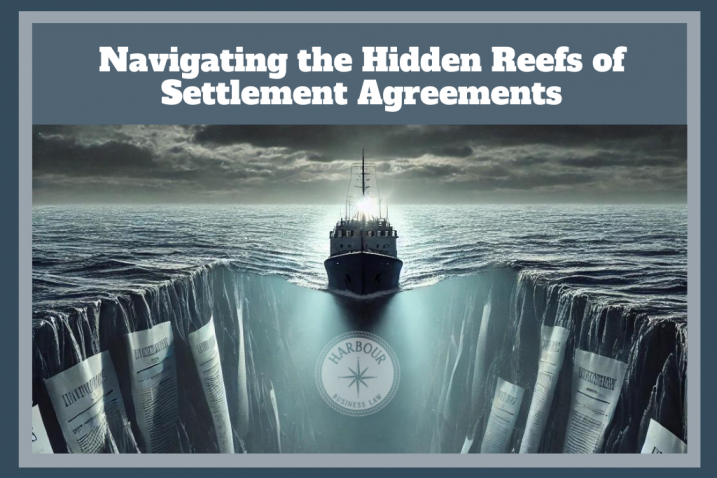
By: Katelyn J. Dougherty, Esq.
Settlement agreements are a common tool for resolving disputes outside of litigation. However, they are not without their risks. A poorly drafted settlement agreement can lead to misunderstandings, future disputes, and unintended consequences. Below, we explore some vulnerabilities and pitfalls that parties should be aware of when negotiating and drafting settlement agreements.
One significant pitfall in settlement agreements is the use of overly broad or vague language. Ambiguities in the terms can lead to differing interpretations by the parties involved, which can, in turn, result in future disputes. For example, a clause that states that one party will “cease certain activities” without clearly defining what those activities are can result in confusion and disagreement over what exactly was agreed upon.
Solution: Careful attention to detail is essential. Clear, precise language should be used, and all terms should be explicitly defined to ensure that both parties mutually understand the agreement’s provisions.
Settlement agreements, particularly those involving complex issues such as tax implications or regulatory compliance, can have unintended legal or financial consequences. For instance, a considerable financial payment settlement could have tax implications that should be considered during the negotiation process. Additionally, in some situations, regulatory requirements could apply but might be inadvertently overlooked, leading to compliance issues later on.
Solution: Involving legal and financial experts during the drafting process can help identify potential pitfalls and allow for a better understanding of any implications of the agreement.
Release provisions are critical components of settlement agreements, as they determine which claims the parties waive. If the release is too broad, it may prevent a party from pursuing legitimate future claims. Conversely, if it is too narrow, it may fail to provide sufficient protection against further litigation. Additionally, if it includes unrelated matters, it could cause an impasse that leads back to litigation.
Solution: A well-drafted release clause should strike a balance, clearly specifying the claims being released while ensuring that neither party is unfairly restricted from pursuing valid claims in the future.
Even with the best intentions, disputes may arise after a settlement agreement has been executed. If the agreement does not include a mechanism for resolving such disputes, the parties may find themselves without a clear path forward, leading to further legal battles.
Solution: Including a dispute resolution mechanism, such as mediation or arbitration, within the settlement agreement can provide a structured process for addressing any issues that arise later, potentially avoiding costly and time-consuming litigation.
Making sure all parties comply with the terms of a settlement agreement can be challenging, notably if the agreement lacks precise enforcement mechanisms. Without these, a party may fail to uphold its end of the bargain, leaving the other party with limited recourse options.
Solution: The settlement agreement should include detailed enforcement provisions, specifying the consequences of non-compliance and outlining the steps that the aggrieved party can take to enforce the terms of the agreement.
Confidentiality clauses are included in settlement agreements to protect sensitive information, and in some cases, the contents of the agreement itself. However, these clauses can sometimes be too restrictive, potentially preventing a party from disclosing important information to regulatory bodies or other necessary parties. This can create legal and ethical dilemmas, particularly if the information pertains to public safety or compliance with the law.
Solution: Confidentiality clauses should be carefully drafted to protect sensitive information while allowing for necessary disclosures to regulatory authorities or other relevant parties.
In some cases, settlement agreements may reflect an imbalance of power between the parties, leading to unfair terms for the weaker party. This can occur when one party has significantly more resources or bargaining power than the other, resulting in an agreement that disproportionately favors the stronger party.
Solution: Fairness in negotiations is crucial. Legal representation for both parties can help ensure that the agreement is equitable and that the rights and interests of both parties are adequately protected.
Specific clauses in settlement agreements, such as non-disparagement or non-compete clauses, can raise ethical or legal issues. If these clauses are overly restrictive or violate public policy, they may not be enforceable and could expose the parties to legal challenges.
Solution: Ensure that all clauses within the settlement agreement comply with applicable laws and ethical standards. Legal counsel for each party can help pinpoint and flush out potential issues, thereby reducing the risk of future legal complications.
Conclusion
Settlement agreements are valuable tools for resolving disputes but must be carefully crafted to avoid common pitfalls. By paying close attention to the language used, considering potential unintended consequences, and ensuring that all provisions are fair and enforceable, parties can create a settlement agreement that effectively resolves their dispute without leading to future problems. Consulting with legal professionals throughout the process is crucial to safeguarding the interests of all involved.
For tailored advice on crafting a settlement agreement that suits your specific situation, consult with a legal professional who can help ensure that your interests are protected.
_____________________________________________________
Don’t have a business attorney? Get in touch with our team by emailing Info@harbourbusinesslaw.com.
_____________________________________________________
This Blog was written by Founding Attorney, Katelyn Dougherty.
DISCLAIMER: This blog is for educational purposes only and does not offer nor substitute legal advice. This blog does not establish an attorney-client relationship and is not for advertising or solicitation purposes. Any of the content contained herein shall not be used to make any decision without first consulting an attorney. The hiring of an attorney is an important decision not to be based on advertisements or blogs. Harbour Business Law expressly disclaims any and all liability in regard to any actions, or lack thereof, based on any contents of this blog.